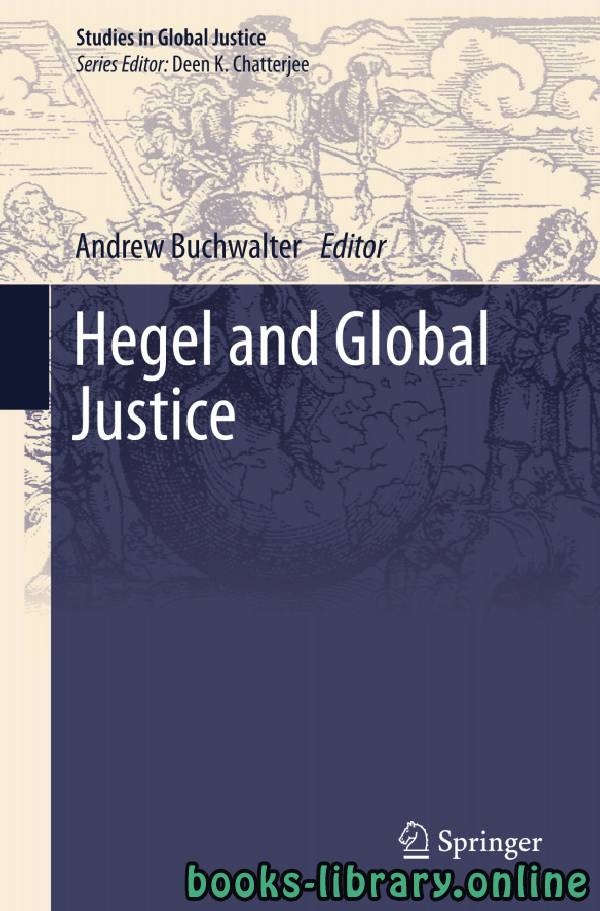📘 قراءة كتاب Hegel and Global Justice أونلاين


نون باللغة الانجليزية
كلية القانون بالانجليزي
تعريف القانون العام بالانجليزي
كتابة كلمة قانون بالانجليزي
تخصص قانون بالانجليزي
محامي بالانجليزي
ترجمه القانون بالانجليزي
قانوني بالانجليزي
القانون الانجليزي pdf
مادة مصطلحات قانونية باللغة الانجليزية
تحميل كتاب مصطلحات قانونية باللغة الانجليزية pdf
تحميل قاموس قانوني عربي انجليزي pdf
معجم القانون pdf
مصطلحات القانون الجنائي باللغة الانجليزية
جميع الكلمات القانونية باللغة الانجليزية
تعريف القانون باللغة الانجليزية
In the burgeoning academic discussion of global justice, little attention has been
accorded Hegel. This is not surprising, for Hegel is generally considered to offer
little constructive as regards issues of international ethics or justice. Not only
does his account of political morality seem restricted chiefly to the ethos of
particular communities; not only is he assumed to reject as incoherent any form
of cosmopolitanism; his view of international relations seems focused on the
exigencies of fully sovereign and self-sufficient nation-states whose interactions—
defined above all by power, force and bellicosity—possess an anarchic character not
evidently subject to higher moral or political authority. Moreover, Hegel’s political
thought culminates in a philosophy of history that appears not only to glorify
Western society, but to assert that other cultures have value only to the degree that
they contribute to the advancement of the former.
This book challenges many of these assumptions. While not fully denying the
validity of the conventional assessment, the authors of this volume—prominent
interpreters of Hegel and his practical philosophy—present a more nuanced and
variegated picture of his contribution to the issue of global justice. Not only is
Hegel revealed to address the topic in a rich and instructive manner; he is shown
to do so in a way that provides perspectives on and challenges to aspects of the
present discussion. He is shown to do so, moreover, with regard to many of the
themes comprising the current discussion of global justice. These include universal human rights, international law, transnationalism, cosmopolitanism, economic
globalization, global socio-economic justice, global conflict, planetary destruction,
intercultural recognition, global governance, global citizenship, the global public
A. Buchwalter ()
Department of Philosophy, University of North Florida, Jacksonville, FL 32224, USA
e-mail: abuchwal@unf.edu
A. Buchwalter (ed.), Hegel and Global Justice, Studies in Global Justice 10,
DOI 10.1007/978-90-481-8996-0 1,
© Springer ScienceCBusiness Media B.V. 2012
1
2 A. Buchwalter
sphere, a global shared identity, and a global ethical culture. In pursuing these
themes the contributors to this volume also consider Hegel’s relationship to many
of the theorists associated with current discussions of global justice, including
Anthony Appiah, Hannah Arendt, Ulrich Beck, Seyla Benhabib, Simon Caney,
Jacques Derrida, Richard Falk, J¨urgen Habermas, Thomas Hobbes, Immanuel Kant,
Will Kymlicka, David Miller, Thomas Nagel, Martha Nussbaum, Thomas Pogge,
John Rawls, and Peter Singer.
That the authors of this volume do address the theme of Hegel and global justice
is not to say, however, that they so in the same way. They disagree about what
may be meant by global justice, they differ in their understandings of Hegel, they
differ on whether focus should be on Hegel’s own position on international relations
or on claims he makes elsewhere that can be applied to those relations, and they
adopt differing views on whether the task at hand involves appeal to Hegel’s own
stated views or to a reconstructed “Hegelian” account that may even be at odds the
former. These differences notwithstanding, however, the essays in the book exhibit
a common orientation, one that may be captured by the term so central to Hegel and
to Hegelian thought generally: dialectics.
Dialectics is a contested term both in Hegel research and theory generally.
For present purposes, it may be construed as the three-fold effort to challenge
conventional dichotomies, to locate commonalities in seeming opposites, and to
specify the internally differentiated character of the commonalities themselves.
In different ways, and with differing degrees of emphasis, the authors in this
volume explore the issue of global justice from a dialectical perspective. Among
other things, they advance proposals that in diverse and mediated ways surmount
abstract distinctions between, say, universal rights and cultural diversity, state
sovereignty and cosmopolitan law, bounded communities and transnational commonalties, global governance and local self-determination, national identity and
global membership, negative and positive liberties, negative and positive duties, and
conflict and comity.
A specific articulation of Hegel’s dialectical approach to global justice is
reflected in the use by this volume’s authors of recognition theory. Recognition
theory is rooted in the famous master–slave dialectic Hegel presents in the Phenomenology of Spirit, but it is central to his practical philosophy as a whole.
Recognition theory is a highly nuanced epistemological, ontological, ethical, sociopolitical, and cultural doctrine, with multiple components. Generally speaking,
though, recognition theory, for Hegel, involves at least the following four claims:
(1) individual identity is constituted only in relations of reciprocal recognition; (2)
such relations take shape in struggles predicated typically on surmounting modes
of misrecognition; (3) recognitive social relations tendentially generate forms of
shared or common identity; and (4) notions of common identity themselves have
full meaning and reality only to the degree that the members of a community
recognize their commonality. In different ways many of the contributors to this
volume employ components of recognition theory to illuminate features of Hegel’s
account of global justice. These components are used to explicate Hegel’s notions
of political sovereignty, shared identity, cosmopolitanism, human rights, planetary
في المناقشة الأكاديمية المزدهرة للعدالة العالمية ، كان هناك القليل من الاهتمام
منح هيجل. هذا ليس مستغربا ، لأنه يعتبر عموما هيجل لهذا العرض
بناءة قليلا فيما يتعلق بقضايا الأخلاق أو العدالة الدولية. ليس فقط
هل روايته للأخلاقيات السياسية تبدو مقيدة بشكل أساسي على روح
مجتمعات معينة ليس فقط أنه يفترض أن يرفض أي شكل غير متماسك
العالمية. نظرته للعلاقات الدولية ويبدو تركز على
مقتضيات الدول القومية ذات السيادة الكاملة والاكتفاء الذاتي التي تتفاعل معها
تم تعريفه قبل كل شيء بالقوة والقوة والعرق - يمتلك شخصية فوضوية لا
من الواضح أن تخضع لسلطة أخلاقية أو سياسية أعلى. علاوة على ذلك ، هيجل السياسية
الفكر يبلغ ذروته في فلسفة التاريخ التي لا تظهر فقط لتمجيد
المجتمع الغربي ، ولكن التأكيد على أن الثقافات الأخرى لها قيمة فقط إلى درجة ذلك
أنها تسهم في النهوض السابق.
يتحدى هذا الكتاب العديد من هذه الافتراضات. بينما لا ينكر تماما
صحة التقييم التقليدي ، واضعو هذا المجلد - بارز
مترجمين من هيجل وفلسفته العملية - تقديم أكثر دقة و
صورة متباينة لمساهمته في قضية العدالة العالمية. ليس فقط هو
كشف هيجل عن معالجة الموضوع بطريقة غنية وتعليمية ؛ هو يظهر
للقيام بذلك بطريقة توفر وجهات نظر وتحديات لجوانب
مناقشة الحالية. يظهر أنه يفعل ذلك ، علاوة على ذلك ، فيما يتعلق بالكثير من
الموضوعات التي تشمل المناقشة الحالية للعدالة العالمية. وتشمل هذه الحقوق العالمية لحقوق الإنسان ، والقانون الدولي ، والقومية العابرة للحدود ، والعالمية ، والاقتصادية
العولمة ، والعدالة الاجتماعية والاقتصادية العالمية ، والصراع العالمي ، وتدمير الكواكب ،
الاعتراف بين الثقافات والحكم العالمي والمواطنة العالمية والجمهور العالمي
أ. بوخوالتر ()
قسم الفلسفة ، جامعة شمال فلوريدا ، جاكسونفيل ، فلوريدا 32224 ، الولايات المتحدة الأمريكية
البريد الإلكتروني: abuchwal@unf.edu
A. Buchwalter (ed.)، Hegel and Global Justice، Studies in Global Justice 10،
DOI 10.1007 / 978-90-481-8996-0 1 ،
© Springer ScienceCBusiness Media B.V. 2012
1
2 أ. بوخوالتر
كرة ، هوية عالمية مشتركة ، وثقافة أخلاقية عالمية. في متابعة هذه
المواضيع التي ينظر فيها المساهمون في هذا المجلد إلى علاقة هيجل بالكثيرين
من المنظرين المرتبطة المناقشات الحالية للعدالة العالمية ، بما في ذلك
أنتوني أبياه وهانا أرندت وأولريش بيك وسيلا بن حبيب وسيمون كاني ،
جاك دريدا ، وريتشارد فالك ، ويورغن هابرماس ، وتوماس هوبز ، وإيمانويل كانت ،
ويل كيمليكا ، ديفيد ميلر ، توماس ناجيل ، مارثا نوسباوم ، توماس بوغ ،
جون رولز ، وبيتر سينجر.
أن مؤلفي هذا المجلد يتناولون موضوع هيجل والعدالة العالمية
لا يعني ، مع ذلك ، أنهم كذلك بالطريقة نفسها. يختلفون حول ما
قد يكون المقصود بالعدالة العالمية ، فهي تختلف في فهمهم لهيجيل ، هم
يختلفون حول ما إذا كان ينبغي التركيز على موقف هيجل من العلاقات الدولية
أو على المطالبات التي قدمها في مكان آخر والتي يمكن تطبيقها على تلك العلاقات ، وأنها
تبني وجهات نظر متباينة حول ما إذا كانت المهمة المطروحة تنطوي على جاذبية هيغل
وجهات النظر المعلنة أو إلى حساب "الهيجلية" أعيد بناؤها والتي قد تكون حتى على خلاف
السابق. على الرغم من هذه الاختلافات ، فإن المقالات في الكتاب تظهر
التوجه المشترك ، وهو ما قد يتم التقاطه بواسطة المصطلح شديد الأهمية بالنسبة لهيجل و
إلى الفكر الهيغلي عموما: الديالكتيك.
إن الديالكتيك مصطلح متنازع عليه سواء في أبحاث هيجل أو النظرية بشكل عام.
للأغراض الحالية ، يمكن تفسيرها على أنها جهد ثلاثي الأضعاف للطعن
الثنائيات التقليدية ، لتحديد القواسم المشتركة في الأضداد الظاهرة ، و
تحديد الطابع متباينة داخليا من القواسم نفسها.
بطرق مختلفة ، وبدرجات متفاوتة من التركيز ، والكتاب في هذا
اكتشف المجلد قضية العدالة العالمية من منظور جدلي. من بين
أشياء أخرى ، أنها تقدم المقترحات التي بطرق متنوعة وساطة التغلب عليها
الفروق المجردة بين الحقوق العالمية والتنوع الثقافي ، على سبيل المثال ، الدولة
السيادة والقانون العالمي والمجتمعات المحصورة والقواسم المشتركة العابرة للحدود الوطنية والحكم العالمي وتقرير المصير المحلي والهوية الوطنية
العضوية العالمية ، الحريات السلبية والإيجابية ، الواجبات السلبية والإيجابية ، و
الصراع و comity.
هناك صياغة محددة لنهج هيجل الجدلي نحو العدالة العالمية
ينعكس في استخدام مؤلفي هذا المجلد لنظرية الاعتراف. التعرف على
تتجذر النظرية في ديالكتيك الجدلي الشهير الذي يقدمه السيد والعبد في ظاهرة الروح ، لكنها أساسية لفلسفته العملية ككل.
نظرية الاعتراف هي عقيدة معرفية شديدة الدقة ، ونظرية ، وأخلاقية ، واجتماعية - سياسية ، وثقافية ، مع مكونات متعددة. بشكل عام،
ومع ذلك ، تتضمن نظرية الاعتراف بالنسبة إلى Hegel المطالبات الأربعة التالية على الأقل:
(1) لا تتشكل الهوية الفردية إلا في علاقات الاعتراف المتبادل ؛ (2)
هذه العلاقات تأخذ شا
سنة النشر : 2012م / 1433هـ .
نوع الكتاب : pdf.
عداد القراءة:
اذا اعجبك الكتاب فضلاً اضغط على أعجبني و يمكنك تحميله من هنا:

شكرًا لمساهمتكم
شكراً لمساهمتكم معنا في الإرتقاء بمستوى المكتبة ، يمكنكم االتبليغ عن اخطاء او سوء اختيار للكتب وتصنيفها ومحتواها ، أو كتاب يُمنع نشره ، او محمي بحقوق طبع ونشر ، فضلاً قم بالتبليغ عن الكتاب المُخالف:
 قبل تحميل الكتاب ..
قبل تحميل الكتاب ..
يجب ان يتوفر لديكم برنامج تشغيل وقراءة ملفات pdf
يمكن تحميلة من هنا 'http://get.adobe.com/reader/'


 منصّة المكتبة
منصّة المكتبة